#Valentina Frascaroli
Explore tagged Tumblr posts
Text
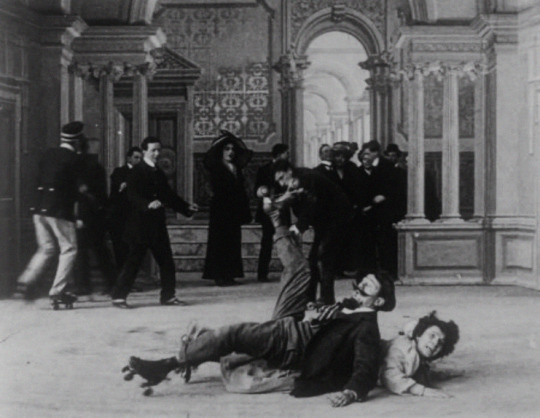
“Film Comedy’s Eves” Watchalong
You know how, when you read a book on film, you inevitably inflate your to-watch list to untenable levels (or pause your reading to check some titles out)? Or is that just me?
On that note, I’ve been reading Steve Massa’s Slapstick Divas: The Women of Silent Comedy. So far, it’s an expansive, indispensable survey of the work of women in the early days of film comedy with a few cheeky extras thrown in. As a devotee of The Silent Comedy Watch Party, I was already familiar with some of the women Steve profiles in the book, but obviously I wanted to see as much of their work as possible.
So, I put together a playlist featuring most of the women from the first chapter of the book, “Film Comedy’s Eves.” The list below was curated based on the prominence of the women in the film as well as general quality (although how good a comedy is is highly subjective!), but the youtube playlist has a few more titles included.
Two quick presentation notes:
Some of the videos have music and some don’t, so you may want to check your volume level.
The intertitles for some of these films are not in English, so be sure you have captions turned on for English translations.
I didn’t do write-ups for the films or the divas because if these films interest you, you should check out Steve’s book! I would also be remiss if I didn’t note that many of the women from this chapter of Slapstick Divas are featured on the Cinema’s First Nasty Women set. (See if your local library has a copy!)
---
Little Moritz enlève Rosalie / Little Moritz Runs Away with Rosalie (1911)
[letterboxd | imdb]
The Diva: Sarah Duhamel (Rosalie)
youtube
---
Boireau et la gigolette (1912)
[letterboxd | imdb]
The Diva: Valentina Frascaroli
youtube
---
Léontine garde la maison / Léontine Keeps House (1912)
[letterboxd | imdb]
The Diva: Léontine (performer as yet unidentified)
youtube
Watch more BELOW the JUMP!
---
Cunégonde femme cochère / Cunégonde the Coachwoman (1913)
[letterboxd | imdb]
The Diva: Little Chrysia
youtube
---
L’acqua miracolosa / The Miracle Water (1914)
[letterboxd | imdb]
The Diva: Gigetta Morano
youtube
---
Lea si diverte / Lea’s Joke (1912)
[letterboxd | imdb]
The Diva: Lea Giunchi
youtube
---
The Handy Man (1923)
[letterboxd | imdb]
The Diva: Mathilde Comont
youtube
---
Twelfth Night (1910)
[letterboxd | imdb]
The Diva: Florence Turner
youtube
---
All on Account of the Milk (1910)
[letterboxd | imdb]
The Diva: Mary Pickford
youtube
---
Her Crowning Glory (1911)
[letterboxd | imdb]
The Diva: Flora Finch
youtube
☕Appreciate my work? Buy me a coffee! ☕
#silent film#silent cinema#classic film#classic movies#film#american film#silent movies#1920s#1890s#1910s#silent comedy#Steve Massa#Lea Giunchi#mary pickford#Valentina Frascaroli#Leontine#Little Chrysia#Mathilde Comont#Florence Turner#Flora Finch#Gigetta Morano#Sarah Duhamel#film recommendation#film history#cretinetti#stan laurel#marcel perez#french cinema#cinema italiano#british film
21 notes
·
View notes
Text

Valentina Frascaroli (Torino, 1890 - Neuilly-sur-Seine, 1955)
0 notes
Text
18 gennaio ... ricordiamo ...
18 gennaio … ricordiamo … #semprevivineiricordi #nomidaricordare #personaggiimportanti #perfettamentechic
2022: André Leon Talley, giornalista statunitense. (n.1949) 2022: Yvette Mimieux, all’anagrafe Yvette Carmen Vivieux, attrice statunitense che è stata in attività nel cinema e in televisione. Sposò il regista cinematografico Stanley Donen e Howard RubyNon ebbe figli. (n.1942) 2021: Catherine Rich, Catherine Simone Henriette Marie Renaudin, attrice francese. Sposò Claude Rich e nacquero due…
#18 gennaio#Adriana Caselotti#André Leon Talley#Catherine Rich#Catherine Simone Henriette Marie Renaudin#Cecil Beaton#Charles John Holt#Diana Lewis#Frances Dean#Frances Drake#Gene Colonnello#Gertrude Olmstead#Grisina#Jack Holt#Joseph Rudyard Kipling#Kathleen Byron#Kathleen Elizabeth Fell#Lois June Nettleton#Lois Nettleton#Luciano Re Cecconi#Madame Grisina#Morti oggi#Nancy Coleman#Renato Guttuso#Ricordando ..#Sarah Lynne Marshall#Sarah Marshall#Sir Cecil Walter Hardy Beaton#Teresina Negri#Valentina Frascaroli
0 notes
Text

maciste alpino (1916)
#giovanni pastrone#piero fosco#bartolomeo pagano#maciste#valentina frascaroli#title in the middle of the movie
0 notes
Text

Valentina Frascaroli
Vintage French postcard. Édition Pathé Frères, 1910s. Photo Oreste Castagneri. M.lle Frascaroli.
104 notes
·
View notes
Text
The Emigrant 1915
Director / Director: Febo Mari – Plot and script / Story and Screenplay: Febo Mari – Photography / Director of photography: Christmas Chiusano, Segundo De Chomón – Performers / Cast: Ermete Zacconi (The Emigrant / The Emigrant), Valentina Frascaroli (Sua daughter / his daughter), Enrichetta Sabbatini (His wife / His wife), Felice Minotti (colleague / The colleague), Amerigo Manzini (Il Conte /…
View On WordPress
0 notes
Text
THE EMIGRANT
New Post has been published on https://www.aneddoticamagazine.com/the-emigrant/
THE EMIGRANT

THE GREAT ACTOR ERMETE ZACCONI, ONE OF THE BEST EXAMPLES OF “VERISM” OF THE ITALIAN SILENT CINEMA.
Regia/Director: Febo Mari – Soggetto e sceneggiatura/Story and Screenplay: Febo Mari – Fotografia/ Director of photography: Natale Chiusano, Segundo De Chomón – Interpreti/Cast: Ermete Zacconi (L’emigrante/The Emigrant), Valentina Frascaroli (Sua figlia/his daughter), Enrichetta Sabbatini (Sua moglie/His wife), Felice Minotti (l collega/The colleague), Amerigo Manzini (Il Conte/The Count, non appare nella copia/does not appear in this copy), Lucia Cisello (La mezzana/The procuress, non appare nella copia/does not appear in this copy).
vimeo
THE EMIGRANT An elderly man decides to leave his small town to seek his fortune in South America and ensure a better life for his wife and daughter. The film displays the difficult stages of preparation for the travel abroad: the sale of the poor furniture to raise the money for the trip, the purchase in the marketplace of the needed working tools, the departure attended by the entire village. The journey by ship, despite the poor conditions of the third-class travelers, is full of hope, however, reached his destination, the immigrant realizes that for a man of his age to find work is not that simple. The film, played by the great stage actor Ermete Zacconi, is one of the best examples of Italian realism in the silent era of cinema. The video is a copy from the film (which is only a fragment of the original film) print held by the Museo Nazionale del Cinema: 35mm, positive, acetate, 486 m, 24′ at 18 fps, black and white, Italian intertitles, silent.
ELENCO DIDASCALIE / LIST OF INTERTITLES: • L’Emigrante • L’emigrante: Comm. Ermete Zacconi / Sua moglie: Enrichetta Sabatini. / Sua figlia: Valentina Frascaroli / La mezzana: Lucia Cisello / Il conte: Amerigo Manzini • Un robivecchi spoglia la casa misera per il prezzo del viaggio • Al mercato • La marra e la vanga paesane feconderanno le terre d’oltremare • Sono ancora senza lavoro a causa della crisi. Ho qualche promessa ma spero che i guadagni di Maria e le tue economie ti basteranno fino a che io trovi lavoro. • Nel paese della chimera • Le fatiche più gravose. • L’impresa da una parte di paga in vettovaglie che si consumano nel recinto del cantiere. • Dopo un’ora si ritorna al lavoro ed al pericolo. • All’ospedale • Caro padre, sono certa che tu stai bene e pensi a noi come noi possiamo dire di te. Ti scrivo io soltanto perché.. • Scrivo io soltanto perché la mamma non sta troppo bene. Io vado sempre al lavoro, ma il denaro non basta perché le medicine costano care. Perciò la mamma en-… • trerà all’ospedale per raccomandazione d’un bravo signore. Non ti affliggere però non è cosa grave e speriamo esca presto. Ti bacio. Quando ritorni? Tua figlia.
Un uomo non più giovane decide di lasciare il suo piccolo paese per cercare fortuna in Sud America e garantire un futuro migliore alla moglie e alla figlia. Il film ci mostra le tappe dolorose della preparazione al viaggio: la vendita dei poveri mobili per raccogliere i soldi del viaggio, l’acquisto al mercato degli strumenti di lavoro, la partenza accompagnato dall’intero villaggio. Il viaggio in nave, pur nelle condizioni misere dei viaggiatori di terza classe, è colmo di speranza, tuttavia, giunto a destinazione, l’emigrante si rende conto che per un uomo della sua età trovare lavoro non è così semplice. Gli uomini in cerca di lavoro sono tanti e la paga, per i semplici braccianti è assai misera e il lavoro è duro e pericoloso. Nel corso di un lavoro di cantiere l’emigrante ha un grave incidente che lo rende invalido. L’azienda per cui lavorava, però lo costringe a firmare un documento in cui si prende la responsabilità dell’incidente avvenuto, per evitare che si possa rifare con l’assicurazione. Il frammento conservato dalla Cineteca del Museo si ferma qui, mentre i resoconti d’epoca permettono di ricostruire il tragico epilogo in cui la moglie muore e la figlia si lascia sedurre da un ricco conte. Il film è uno dei migliori esempi del realismo del cinema muto italiano, interpretato dal grande attore di teatro Ermete Zacconi. Il video è un riversamento della copia in pellicola conservata dal Museo: 35mm, positivo, triacetato, 486 m, 24′ a 18 fps, bianco e nero, didascalie italiane, muto.
0 notes
Text
Riemerso dalle pieghe della storia.
Inizio degli anni ’90: Negli archivi della Cinemateca Brasileira viene rinvenuto un malconcio frammento di pellicola. Lo spezzone, che misura 740 metri (pari a 26 minuti), viene identificato: si scopre appartenere ad un film prodotto in Italia settant’anni prima. Si tratta de “L’uomo meccanico” di André Deed, visto alla censura nel 1921, con una lunghezza totale di 1821 metri. Lo spezzone del film, ritenuto disperso per decenni, viene consegnato nel 1992 alla Cineteca di Bologna che provvede ad un doveroso restauro. Per ricostruire la trama vengono posti inserti testuali riportanti il resoconto delle sequenze perdute: questo può avvenire attingendo ad alcuni documenti originali conservati in Italia.
La “Cinemateca Brasileira”
l’insegna dell’istituto
Un uomo “artificiale”.
E’ il 1921, il Cinema è ormai una realtà consolidata: nascono i primi serial oltreoceano. L’attore André Deed (noto come Cretinetti) decide di scrivere, sceneggiare e produrre un trittico di film a fianco della moglie Valentina Frascaroli. Di questi, il secondo estratto è un film innovativo e visionario: provvisoriamente denominato “L’Uomo Artificiale“, verrà successivamente intitolato “L’Uomo Meccanico“.
Andrè Deed
Valentina Frascaroli
Locandina del film
La storia narra (in chiave comica e farsesca) la creazione di un automa antropomorfo da parte di uno scienziato. Un giorno, alcuni malviventi rubano il robot e uccidono il suo inventore: l’automa (che può essere comandato a distanza tramite “tele-visione“) viene così utilizzato per compiere atti criminali e seminare il terrore. Sarà il fratello del defunto scienziato a costruire un secondo uomo meccanico. I due robot si incroceranno in un epico scontro all’interno di un teatro.
una scena del film
la tele visione
l’uomo meccanico
Pur non essendo il primo automa del cinema , “L’Uomo Meccanico” risulta affascinante sotto molteplici aspetti. Il rocambolesco ritrovamento e successivo restauro, hanno reso possibile un viaggio alle origini di un argomento caro al cinema di fantascienza: il robot è infatti uno dei soggetti più utilizzati e declinati, a partire dalla donna artificiale di “Metropolis” (prodotto ben sei anni dopo l’androide di Deed). Come moderni Golem, vari “uomini meccanici” hanno affollato trasversalmente la cinematografia: basti pensare all’ecclettico Robby nel capolavoro “Il Pianeta Proibito” o al temibile Gort di “Ultimatum alla Terra“. Più recentemente il pensiero va al letale androide T-800 di “Terminator” , passando per il simpatico Numero 5 di “Corto Circuito” ed il tormentato cyber-poliziotto Murphy di “RoboCop“. La visione di “L’Uomo Meccanico“(qui il link per vedere il film) pur frammentaria, mostra gli albori di un soggetto che ancora oggi affascina e cattura le fantasie dello spettatore.
Haldane of the secret service (1923)
The automatic motorist (1911)
il robot Robby
Il Golem
Il remake di “RoboCop” (2014)
L’UOMO MECCANICO: IL ROBOT RITROVATO Riemerso dalle pieghe della storia. Inizio degli anni '90: Negli archivi della Cinemateca Brasileira viene rinvenuto un malconcio frammento di pellicola.
0 notes
Photo

Valentina Frascaroli plays ‘Margherita Donadieff’, or ‘Mado’, head of a criminal gang and confirmed fire bug, in “L'Uomo Meccanico/ The Mechanical Man”, 1921.
Originally 80+ minutes long, only about 26 minutes still exist.
#Valentina Frascaroli#mado#l'uomo meccanico#the mechanical man#1921#1920's science fiction#silent film
22 notes
·
View notes
Text
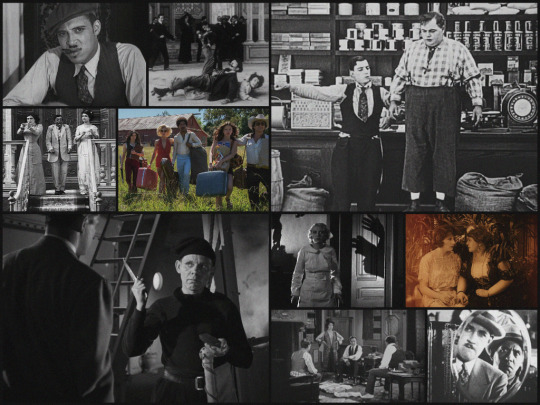
Favorite New-to-Me Films
January ’24
READ on BELOW the JUMP!
(listed in order of collage above, L to R)
Eleven P.M. (1928)
[letterboxd | imdb | kanopy]
Synopsis: Sundaisy, a violinist, tries to fulfill a friend’s dying request to ensure his son is raised away from the criminal element of the city. Unfortunately, Sundaisy is duped by a phony priest, and the boy grows into a low-level crime boss. After a series of misfortunes spurred on by the boy over the course of decades, Sundaisy’s family is nearly ruined. However, Sundaisy’s will for vengeance leads to supernatural consequences. All this is couched in a frame story of a man trying to meet an 11 p.m. deadline.
This is easily my favorite first-time viewing of the month. The synopsis above admittedly does not capture the mystical/transcendental attitude that Eleven P.M. reflects. This is the only film Detroit-based Richard Maurice ever directed, but it displays sophisticated ideas about film storytelling, using an array of devices in inventive ways. It’s always a treat to be reminded of how creative and exciting independent filmmaking can be in America. If you want to check this one out, I advise you to keep an open mind and not approach it with an overly literal, nitpicky mindset. Let Richard Maurice take you on this ride and I don’t think you’ll regret it!
I watched this on the Pioneers of African-American Cinema box set, which I can’t recommend highly enough. The films are outstandingly curated and contextualized and the set showcases an often-overlooked but indispensable part of American cultural history. A lot of the films are also available on streaming through kanopy, which you may be able to access with your library card if you live in the US.
---
Lea on Rollerskates / Lea sui pattini (1912)
[letterboxd | imdb]
Synopsis: Lea isn’t allowed by her parents to go rollerskating with a friend, so she decides to skate in her own bedroom. She proceeds to wreak havoc in the home before an accidental self-defenestration sets her free to wreak havoc at the roller rink instead.
A jam-packed, stunt-heavy bit of nonsense led by Lea Giunchi. I’ve watched quite a few of her films now and I’ve learned this is pretty standard for her. I love each and every pratfall.
---
Two Girls are in Love with Foolshead / Le due innamorate di Cretinetti (1911)
[letterboxd | imdb]
Synopsis: Cretinetti is dating two girls at the same time. The girls decide to duel, but Cretinetti is the one who loses… repeatedly.
I’ve finally gotten around to watching more Andre Deed films and this one was a highlight for January. I don’t know who the skinny woman is, but she and Valentina Frascaroli are great together.
---
X (2022)
[letterboxd | imdb]
Synopsis: A crew of filmmakers leave Houston, TX for the country in order to film a farm-themed porn. The producer of course did not disclose the nature of their stay to the elderly property owners. Said owners have ulterior motives in renting their cabin and respond violently to the group.
Appreciative of all of Ti West’s work, and X has so much going on and so much to say that I originally typed out two full pages (single spaced) on it before I knew it. I won’t be sharing those two pages because I think there are a few points on the approach to gore in recent horror movies that I need to mull over more. For now though, I’ll just say, I didn’t enjoy X at all, but I deeply appreciate what Ti West is putting out there. I probably won’t watch it again and I’m going to be sure my stomach is prepared for whenever I get around to Pearl (2022).
---
The Hayseed (1919)
[letterboxd | imdb | Silent Comedy Watch Party]
Synopsis: Fatty wants to marry Molly, but so does the sheriff. Buster tries to keep the general store in working order while the sheriff plots against Fatty.
Luke the dog is one of my top 5 movie dogs of all time. I’ve never made an official list, but I know in my heart that Luke is at the top. Also, I adore how many modern professional wrestling moves you end up seeing in Fatty/Buster collaborations! In this instance, note the dance sequence with the lady who gets swung around wildly.
---
The Ghost Ship (1943)
[letterboxd | imdb]
Synopsis: Tom Merriam, a young officer, reports for his first commission on a long haul trip on the Altair. The captain has a bit of a strange vibe, but the newbie likes him, at first. As crewmen perish under the captain’s leadership, and the captain’s lectures take on a more sinister tone, Tom knows he needs to act to save the remaining crew and the ship.
Checked this out as I was on a Val Lewton kick not knowing much about it beforehand. I did not expect it to be a movie about fascism done in microcosm. So, if you were looking for a movie about ghosts or a Flying Dutchman, this ain’t it. Its off-beat structure amped up the tension, though the denouement was a little too pat. Cinematography was fantastic, as you might expect from Nicholas Musuraca. I hope Sir Lancelot got two checks for how much his singing contributes to the movie. Richard Dix is such a skilled actor in everything I’ve seen him in, but he is pitch-perfectly terrifying in this movie.
---
Miss Pinkerton (1932)
[letterboxd | imdb]
Synopsis: A nurse who’s bored with hospital work gets assigned to an old woman who’s ailing after a big shock: finding the dead body of her nephew. The detective on the case asks the nurse to gather reconnaissance for him at the house and she gets all the excitement she can stomach as a result.
Miss Pinkerton is a pre-code gem I somehow have never seen before, despite my devotion to Joan Blondell. The plot and characters are interesting, the cinematography (done by Barney McGill) and staging of the film is very dynamic and Joan Blondell brings so much to Miss Pinkerton with her signature effervescent sass. It’s also just over an hour long, so it would make a great watch for one of those evenings where you’re indecisive but want to find something compelling but compact.
---
Phil-for-Short (1919)
[letterboxd | imdb]
Synopsis: Damophilia “Phil” Illington is a free-spirited tomboy brought up by a Greek-professor father and his right-hand man, Pat. Her lack of lady-like decorum raises the ire of two town elders, who are also the local killjoys. When her father passes away, one of the elders abuses his position of power to force her into a conservatorship. Phil disguises herself as a boy and hightails it with Pat. While on the lam, Phil makes the acquaintance of a young woman-hating Greek professor. Through a set of misadventures, Phil and the Professor end up married, but it takes quite a bit of work after the marriage for them to find happiness with one another.
Great characters and performances and I enjoyed marriage not being treated as the resolution or an end point to the story. It’s also very endearing to see such a pervasively queer story about a man and a woman getting together.
---
The Mystic (1925)
[letterboxd | imdb]
Synopsis: A con artist enlists the help of Hungarian travelling carnival performers to enact a phony medium scheme against the hoi polloi of New York City.
Tod Browning is a sure-bet filmmaker for me and The Mystic was no exception. Highlights for me were: the execution of the seance sequences, Erte’s gorgeous costumes for Aileen Pringle, and an ending that I hoped would happen but assumed wouldn’t!
---
There Ain’t No Santa Claus (1926)
[letterboxd | imdb | Silent Comedy Watch Party]
Synopsis: When Christmas rolls around, Charley doesn’t have enough money to both pay the rent and buy his wife a present. He uses his $80 to buy her a watch, instead of the rent, and his nasty landlord/next-door-neighbor steals the watch. Christmas Day turns into a free for all, when both Charley and his landlord dress as Santa and plan to enter via their respective chimneys for their respective children.
Well-paced, great comeuppance, and very well-executed gags. Additionally, Charley Chase looks absolutely outrageous in his Santa wig and he knew it!
---
This one didn’t make it into the collage, but it’s still on the list:
Little Moritz Runs Away With Rosalie / Little Moritz enlève Rosalie (1911)
[letterboxd | imdb]
Synopsis: Little Moritz loves Rosalie and wishes to marry her, but her father objects. So, of course Rosalie and Mortiz run away together in his funky little flivver, but dad and the family dog give chase.
Most of this short is the chase sequence and it’s very well executed. Sarah Duhamel is so cute and so is her family dog. The location shooting is nicely done (was this shot in Nice?) This charming poster captures the vibe of the short perfectly:

---
In January we were hit with a nasty winter storm and, while we were relatively lucky in my neighborhood, we were without internet for a third of the month. So, we ended up relying on our home video collection, which accounts for five of the films above and me re-watching two seasons of Soap and Fritz Lang’s Niebelungenlied (1924).
Despite the holdup, I continued my “Lost, but Not Forgotten” series with The Dancer of the Nile (1923) and started a limited spin-off series, “How’d They Do That?” about special effects and stunts in the silent era.
I also made themed gif & still sets for: Miss Pinkerton, Dementia (1955), and A Christmas Carol (1971).
Here’s to a less eventful February! And, as always, if you’re interested in any of these films, but have specific content warning needs, feel free to ask me.
#classic film#classic movies#roundup#month in review#film#american film#French Film#cinema italiano#italian film#horror film#horror#silent cinema#silent film#1920s#1910s#1930s#1940s#2020s#silent comedy#Val Lewton#Valentina Frascaroli#Lea Giunchi#Sarah Duhamel
12 notes
·
View notes
Text
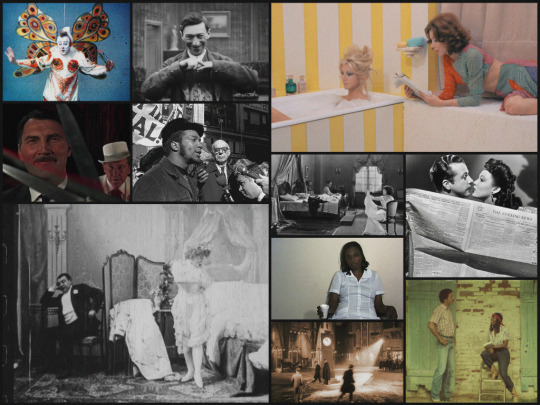
Favorite New-to-me Films
February ‘24
(listed in order of collage above, L to R)
READ on BELOW the JUMP!

The Clowns / I Clowns (1970)
[letterboxd | imdb | kanopy (US)]
Synopsis: Fellini delves into the world of European clowning, traveling with his crew to various capitals of clown culture. From a dramatization of his own challenging childhood experience with clowns to a barrage of performances by current clowns (in a variety of unique venues) and recreations of historical circus-based acts, Fellini creates a dizzying comedic portrait of an artform struggling to survive. (CW/TW: blackface, as seen in one recreation of a historical act.)
---
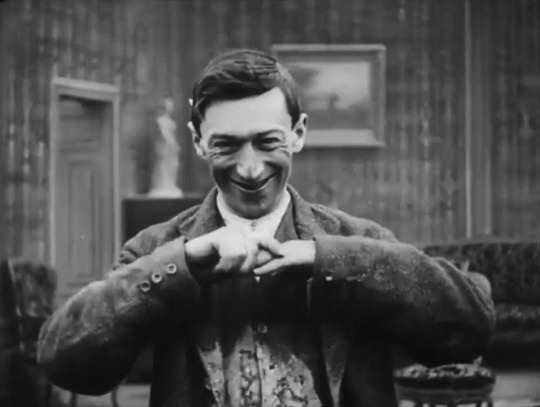
Gribouille redevient Boireau (1912)
[letterboxd | imdb]
Synopsis: In this meta short, French-born comedian André Deed dramatizes (or slapstick-izes) his move from Italy, where he made films as Cretinetti (Gribouille in France) for Itala, to France, where he would continue making shorts under the name Boireau. Cretinetti/Gribouille survives an altercation with the father of his sweetheart Valentina (Valentina Frascaroli), a run in with border patrol, an attempted kidnapping, a train hijacking and subsequent derailing, and being forced at gunpoint to make films for France. Now Boireau, he is rushed onto set where a bit more chaos ensues before he addresses the camera directly and assures us in pantomime that he will keep making films and that his heart is here in France.
---

Torture Garden (1967)
[letterboxd | imdb]
Synopsis: At an amusement park sideshow, a fiendish host, Dr. Diabolo (Burgess Meredith), selects a few of his guests to get a preview of their potential downfalls from Atropos, the Goddess of Destiny. The first customer (Michael Bryant) is warned away from victimizing his uncle and cutting an unholy deal with a demon cat. The second (Beverly Adams) has to look out for the consequences of too ruthlessly pursuing fame in Hollywood. Her cousin (Barbara Ewing) has to look out for a boy and his piano possessed by his dead mother. The final customer (Jack Palance) is an avid Poe fanboy who is at risk of taking his obsession too far. Dr. Diabolo is not a simple carny though, so these glimpses into their respective futures may give them an opportunity to change their fates.
---

The Murder of Fred Hampton (1971)
[letterboxd | imdb]
Synopsis: An unflinching look into the Chicago police’s vicious assassination of Fred Hampton but also a survey of some of the important antifascist work Hampton did with the Black Panthers in his final years.
---
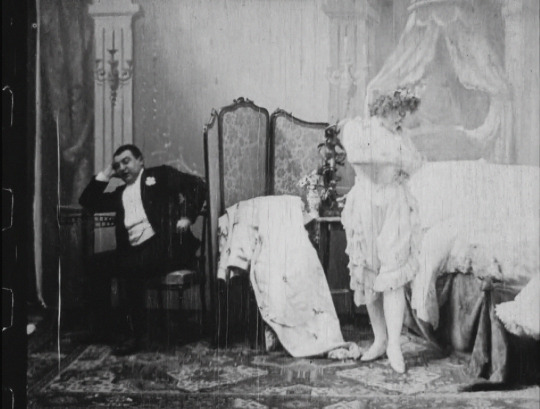
Bedtime for the Bride / Coucher de la mariée (1896)
[letterboxd | imdb]
Synopsis: A new bride (Louise Willy) disrobes before bed on her wedding night.
---
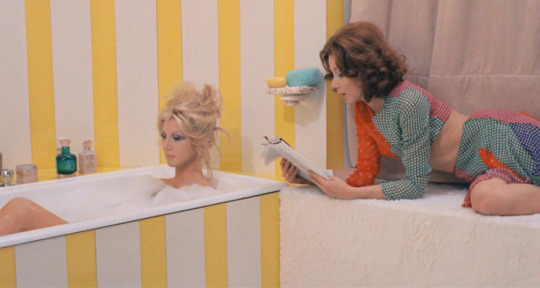
The Others / Le Altre (1969)
[letterboxd | imdb]
Synopsis: Alessandra & Flavia, a lesbian couple living in Rome, decide that they want to have a baby. The process of finding a suitable baby daddy is a series of misadventures but eventually Flavia becomes pregnant. Their relationship is tested but they build a happy home until the potential dads figure out what’s going on. The men want to turn their relationship into big news and an ad campaign; their private lives become public spectacle. Thankfully, Alessandra hatches a scheme to solve all their problems.
---
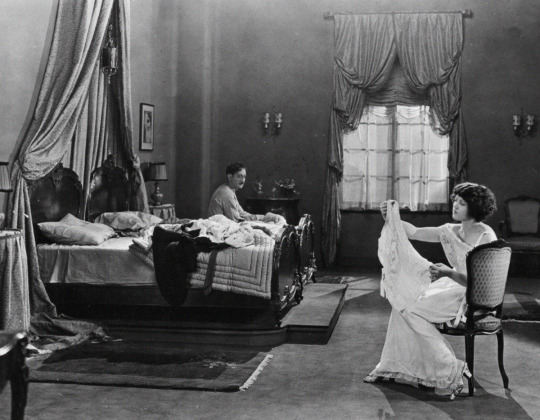
The Marriage Circle (1924)
[letterboxd | imdb]
Synopsis: The marriage of Mizzi and Dr. Josef Stock (Marie Prevost & Adolphe Menjou) is on the rocks. Josef hires a detective to gather enough evidence to secure a divorce. Meanwhile, Mizzi attempts a flirtation with Dr. Franz Braun (Monte Blue), who she soon finds out is the husband of an old friend, Charlotte (Florence Vidor). To complicate matters, Dr. Gustav Mueller (Creighton Hale), who is Franz’s business partner, is in love with Charlotte. A variety of schemes and misunderstandings ensue before the Stocks’ marriage dissolves and the Brauns’ marriage is saved.
---
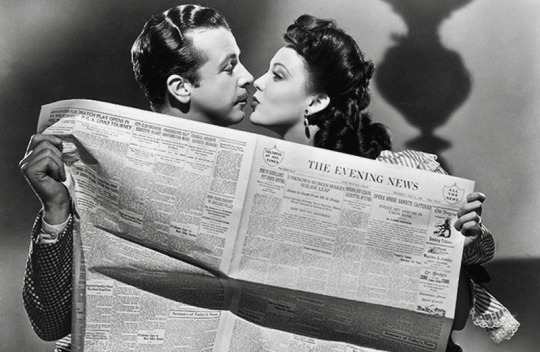
It Happened Tomorrow (1944)
[letterboxd | imdb | tubi (US)]
Synopsis: An aspiring reporter, Larry Stevens (Dick Powell), thinks he would be set for life if he could see one day into the future. Larry’s wish is granted in an unexpected way when he gets a copy of the next day’s newspaper. Larry tries to make the most out of the situation while sparking up a romance with a phony psychic called Sylvia (Linda Darnell). It does not take long before Larry figures out that the scenario for success that he dreamed up may be a nightmare.
---

Personal Problems (1980)
[letterboxd | imdb | kanopy (US)]
Synopsis: A soap opera wrapped in a cinema-verité package, Personal Problems recounts a period in the life of Johnnie Mae (Vertamae Grosvenor), a nurse living in Harlem. Johnnie Mae tries to juggle her job as an ER nurse with an affair with a musician, tension with her husband (who is also having an affair), a father-in-law (who has overstayed his welcome), and a long-term visit from her brother and sister-in-law (who was just released from prison).
---
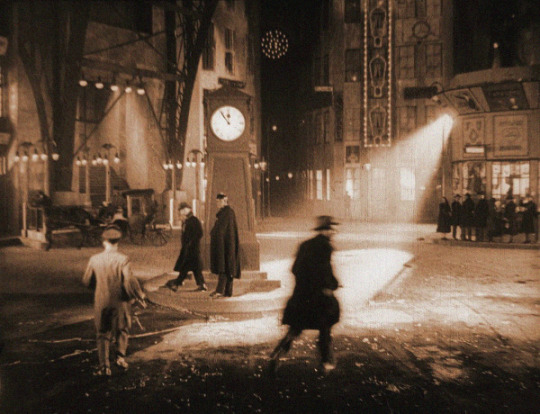
New Year’s Eve / Sylvester (1924)
[letterboxd | imdb]
Synopsis: In this wordless spectacle, a man tries to hold his household together after the antipathy between his mother and his wife boils over one New Year’s Eve.
---
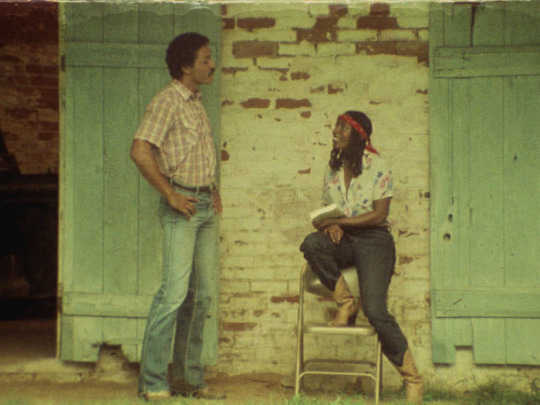
Cane River (1982)
[letterboxd | imdb | kanopy (US)]
Synopsis: Peter (Richard Romain) returns to his small hometown in Louisiana after trying to make something of himself in the big, wide world. When touring a local plantation, tied to his ancestry, he meets Maria (Tommye Myrick) and they begin a romance. However, Maria has saved up for years to leave Natchitoches and go to college and she plans on leaving soon to start school. Various complications arise in their relationship as their different backgrounds and ambitions come into stark contrast.
---
Honorable mention:
Léontine Keeps House / Léontine garde la maison (1912) [letterboxd | imdb]
Boireau et la gigolette (1912) [letterboxd | imdb]
---
This month, I watched a silly amount of silent comedy shorts because I’m reading Steve Massa’s Slapstick Divas and wanted to sort of watch along. I put together a little list of some of the highlights in case you all are also interested in the women of early silent comedy: “‘Film Comedy’s Eves’ Watchalong”
The next installment of Lost but Not Forgotten is a doozy, but it’ll be up very soon! In the meantime, I made a gifset of a few surviving minutes of A Lover’s Oath (1925).
Other themed gif and still sets I put together this month include:
Out of the Unknown: 1.01 No Place Like Earth (1965)

Eleven P.M. (1928)

The Ghost Ship (1943)

---
For March, I’ve got a little cosplay in the works in addition to the next entry in my LbNF series. So stay tuned!
☕ Appreciate my work? Buy me a coffee! ☕
#1890s#1910s#1920s#1940s#1960s#1970s#1980s#month in review#classic film#classic movies#film#american film#cinema italiano#french cinema#german film#british horror#british film#silent cinema#silent film#silent movies#silent era#federico fellini#documentary#horror film#horror#clowns#queer cinema#bill gunn#Freddie Francis#Andre Deed
7 notes
·
View notes
